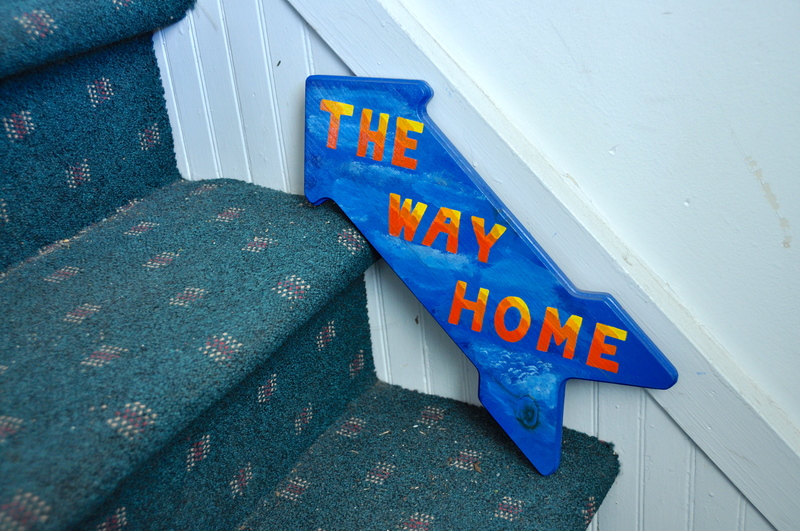Nestled away in a small office in Georgetown is a place where lives marred by unspeakable tragedy are reborn. The Way Home offers ex-offenders a chance to find their way back to society. Staff members literally met their clients at the prison gates.
The nonprofit program provides counseling, case management, mentoring, referrals, transportation and a support system for ex-inmates, many of whom leave prison with nothing more than the clothes on their back.
With its roots in an Episcopal-based prison ministry program started by retired priest Jim Lewis in 1997, the program became an independent nonprofit agency in 2006.
Before the program became The Way Home, Associate Director Rick Chamberlain and Executive Director Barbara Del Mastro joined the prison ministry group. It was a major change for Chamberlain, who had been on the other side of the criminal justice system as a police officer his entire adult life.
|
Benefit features music, food, auction A benefit for The Way Home Inc. has been scheduled for 5:30 p.m. Saturday, April 6, at Irish Eyes, 213 Anglers Road, Lewes. The event features entertainment by award-winning singer and songwriter Doug James, a buffet dinner and silent auction. Tickets are $40 a person or $75 for a couple. To reserve tickets phone 302-856-9870. |
“What was clear was that there was a need for a support program for prisoners when they got out if there was any hope for them to make changes and become productive members of society,” he said.
Using a grant from the state's Criminal Justice Council, Del Mastro became the first employee, and The Way Home got off the ground.
Many are tired of their lifestyle
“Prison is absolutely necessary to keep others safe,” Chamberlain said. Chamberlain said more than 90 percent of people sent to prison in Delaware will be released; more than 20,000 offenders are released each year.
Delaware does not track its recidivism rate - the number of offenders who commit crimes and return to prison. A University of Delaware study comparing The Way Home to the state's prison system found that clients in The Way Home program were far less likely to go back to prison. The report found the odds of The Way Home clients staying out of prison more than five years is 57 percent higher than the odds for other Department of Correction ex-offenders not in the program.
National research shows that 40 percent of ex-offenders return to prison within three years of their release.
The Way Home operates a transitional home for men in Millsboro and works closely with Casa San Francisco in Milton and Crisis House in Georgetown to offer temporary housing for those right out of prison. Chamberlain said the next step is a move to transitional housing, which is in short supply in Sussex County. “We are always playing a shell game,” he said. Pressure is being put on the program as more and more ex-offenders from upstate come to The Way Home in Sussex County.
Chamberlain said most ex-offenders in the program are tired of their lifestyle and want to make changes. He said their needs are basic when they are released from prison: housing and jobs. “It expands after that to counseling and support,” he said.
There is no maximum or minimum participation time, Chamberlain said, because each individual is different. Some get back on their feet in a few months while others need more time. And others want to give back to the program by helping other ex-inmates and speaking with young people.
Funded with grants and private donations, The Way Home deals with about 100 clients a year.
“The bottom line is, people can turn their lives around,” Chamberlain said.
“I'm a lifelong member of The Way Home,” says client Robert Bolden Jr., convicted of second-degree murder at the age of 17. “Now it's about giving back what I took from society.”
Program offers a new beginning
Gathered in an office, four clients speak from the heart about how the program has provided a new beginning as they rebuild their lives outside prison. To them it's about redemption for the terrible crimes they committed. Among the four are two who together served decades of prison time for second-degree murder and another who was convicted of vehicular homicide.
Mostly, it's about support the program offers, they say. It's also about caring.
The four expressed remorse for their crimes and empathy for their victims. They plan to remain with the program to give back to the community and assist other ex-offenders.
Tony Tilson, who has been involved with the program since 1998, spent half of his life in prison. Today, he has a full-time job and has started his own handyman company. Looking much younger than his 43 years, Tilson said staff at The Way Home has become a family to him. To a man who grew up with violence and abuse, and was behind bars most of his adult life, the word family means a lot.
Sent to prison when he was 17 years old, Tilson said taking part in the program's initial Bible study program turned his life around.
He said getting a job was hard, especially when he had to tell prospective employers he was a felon. “The Way Home provides a connection to help you get your foot in the door,” he said. “They help you succeed.”
Without a job, he said, many ex-inmates go back to what they know – what got them in trouble before, and the vicious cycle is repeated.
Matt Haley, a Cape Region entrepreneur who owns SoDel Concepts, has played a key role providing employment for The Way Home clients. Haley operates seven restaurants in coastal Sussex County.
“They became an instant family to me,” says Tracey Greenwood. She struggled with addiction problems, yet even when she relapsed, The Way Home staff stood beside her. “They really love and care about you,” she said.
As soon as she was released from prison, someone directed her to The Way Home because her clothes were dirty. “They gave me $5 so I could do my laundry,” she said. “It's all about the little things.” She fights back the tears as she recounts her first few days out of prison.
That first encounter opened her mind to understand there are people who care. “They showed me that I was worth something,” she said.
A nurse for 15 years, she lost her license and can't get it back because she is now a felon. Yet Greenwood is determined to get back on her feet. She rides a bike two miles to her job at Perdue in Georgetown, but she has her sights set on going back to college.
Greenwood said The Way Home staff would not let her get down after she lost the fight to reinstate her license. “They won't let you feel pity for yourself and got me to focus on my next goal,” she said.
Greenwood said it's refreshing to interact with people who are nonjudgmental.
Jerry Poli said he can only wonder if he would still be behind bars if not for The Way Home. Del Mastro agreed to speak on his behalf at his parole hearing.
He was paroled in 2012 and is finishing up six months of work release. Poli said he had no Social Security card, no driver's license and no job - and nowhere to go.
Thanks to The Way Home, he got his license March 19 and now has some job prospects. “They never give up on you and stay open minded,” Poli said. “I've never had anyone put that kind of trust in me.”
Robert Bolden Jr., who was also sent to prison when he was 17 years old, said his plan when he was released started with The Way Home program; it was at the top of his list. He learned about the program after seeing a story about it in a newspaper. In prison, he attended University of Delaware classes and graduated with a criminal justice degree. “I was not doing time, but doing something with my time,” he said.
Chamberlain was there at his graduation, Bolden said. “And they've been there every step of the way,” he said.
Chamberlain also spoke on behalf of Bolden at his fifth parole hearing; he was paroled in early 2012 and is serving out his remaining time in the work-release program.
Chamberlain said speaking on behalf of clients at parole hearings is not something they take lightly. “It's a huge responsibility. We have to feel strongly about an individual,” he said.
All four said they were surprised when they found out Chamberlain was a retired Delaware State Police trooper. “State police took me to prison, and a retired trooper took me away from prison,” Tilson said.
In fact, Tilson and Chamberlain had crossed paths many years earlier. Chamberlain said he responded to young Tilson's home numerous times for complaints of violence and abuse. Tilson eventually was removed from the home and ended up in foster care.
All four cited example after example explaining how the staff goes beyond the call of duty to support clients. Transportation is an ongoing issue that confronts just about everyone in the program. It's not unusual for staff members or volunteers to answer weekend or nighttime calls from clients.
Bolden said one weekend night, he desperately needed to ride from his job in Rehoboth Beach back to Sussex Correctional Institution. “I called Rick, and he left his family to help me out,” Bolden said. “He didn't have to.”
Chamberlain shrugs it off. “It's just something we do,” he said.





















































